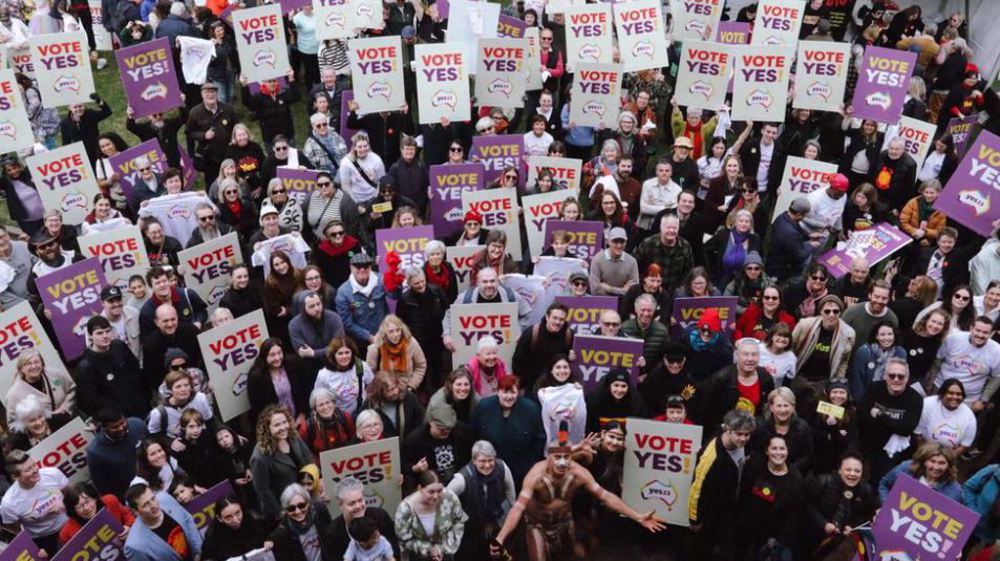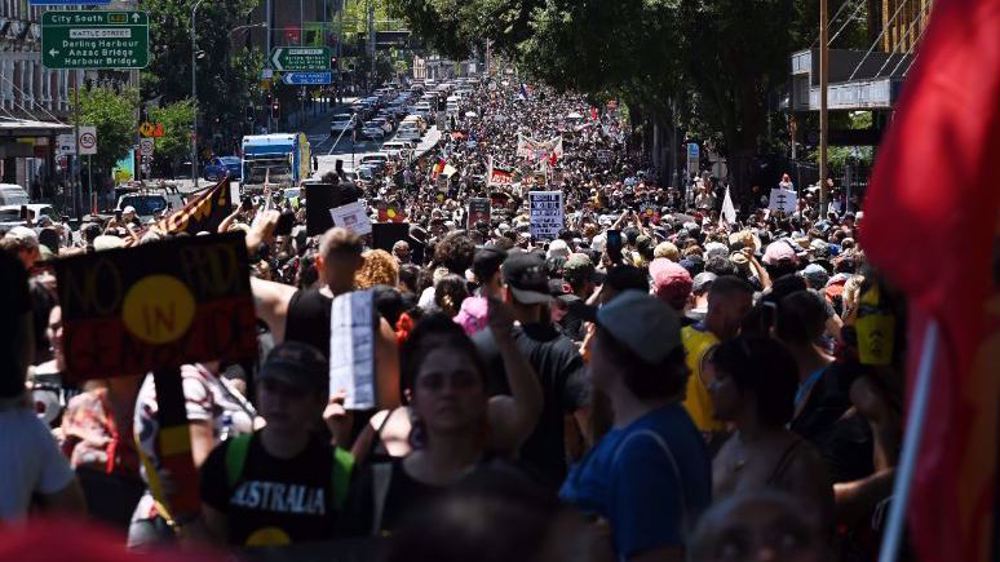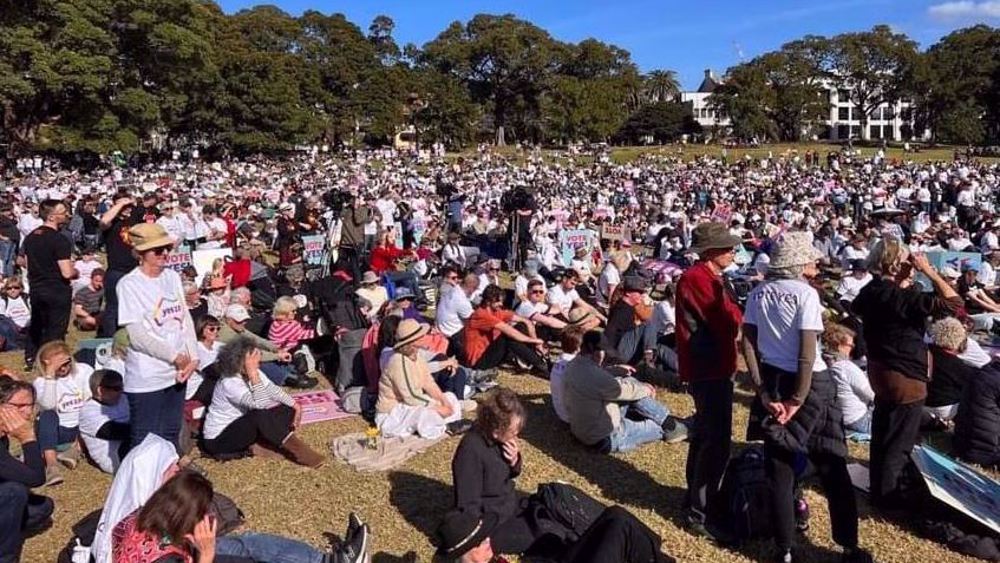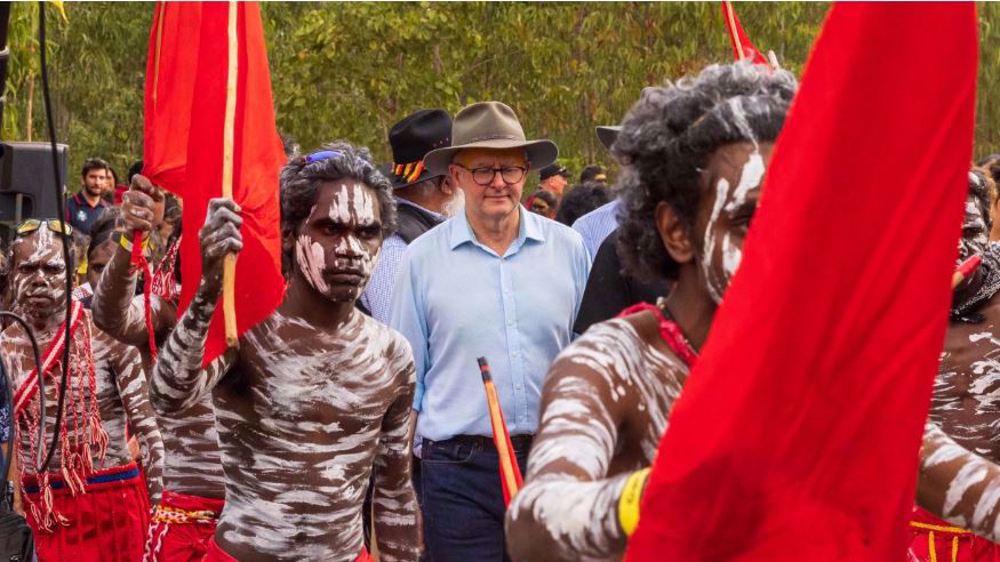Thousands rally in Australia in support of Indigenous reform

Thousands rallied in Australia on Sunday to back a campaign to recognise the country’s Indigenous people in the constitution.
Thousands of people have held demonstrations across Australia in support of a campaign to recognize the country’s Indigenous people in the constitution, ahead of the referendum later this year.
The rallies held on Sunday were organized by the Yes23 campaign group, following a recent dip in support for the constitutional change guaranteeing rights of Indigenous Australians.
The proposal that will be put up for referendum between October and December this year plans to establish an advisory body – the Indigenous Voice to Parliament – aiming to give Aboriginal and Torres Strait Islander people a direct say in the policies that affect them.
Prime Minister Anthony Albanese’s government supports the change; however, the opposition parties have been objecting to the proposal.
During the general elections campaign in May last year, Albanese’s Labor party had pledged to recognize an Indigenous voice in parliament
Wearing T-shirts with “vote yes” slogans, the attendees in the Sydney rally donned caps bearing “the uluru statement,” referring to a key document that calls for an Indigenous Voice.

Massive ‘Invasion Day’ protests staged across Australia on national holiday
Thousands of Australians have marched across the country, rallying in support of indigenous people’s rights and protesting against marking their country’s national day on the date that British colonization of their land started.
According to the statistics given by the Yes23 group to Reuters the crowd in Sydney was about 3,000 and was expected to raise up to 25,000 people in total.
“These community events are opportunities for people to come together and gain valuable information about the importance of a successful referendum later this year,” Yes23 campaign director Dean Parkin said in a statement.
The “day of action” comes after support for the referendum seemed to be declining in accordance with a poll conducted last month, which showed 51 percent “No” to the proposal for the first time.
Meanwhile, the Yes23 group said the dip in polls did not reflect the reality on the ground.
“You don’t necessarily see it on television. You don’t see it in the newspapers, but there are conversations happening around kitchen tables, in sporting clubs, and in workplaces around the country. And that’s just going to grow.” Rachel Perkins, co-chair of Australians for Indigenous Constitutional Recognition, told ABC television on Sunday.
Fred Pascoe, director of the Gulf Regional Economic Aboriginal Trust while speaking to Al Jazeera said that Indigenous people, who make up about 3.2 percent of Australia’s population of almost 26 million and who were not granted full voting rights until the 1960s, are not even mentioned in the country’s constitution.
The constitution of Australia, which came into effect in January 1901, does not recognize the country’s Indigenous population.
The opponents of the proposal on the other hand have argued that the move lacks details and will lead to division among Australians.
The group has been maintaining that the focus of the government should be education, health, safety, and domestic violence within these Indigenous communities.

According to experts getting constitutional change in Australia is difficult.
The government needs to secure a double majority in the referendum, which equals 50 percent of votes nationwide.
In the past, there have been 44 proposals for constitutional change in 19 referendums, and only eight of these have passed.
It is important to mention that a 1967 referendum on Indigenous rights saw a record “Yes” vote.
In the past three decades, more than 400 Indigenous people have died in police custody.
Despite findings and recommendations from a national inquiry in 1991, many have died under suspicious circumstances, some due to negligence or lack of medical assistance. Surprisingly no one has been convicted for these deaths.

Right for Indigenous Voice in Australian parliament hinges on vote: PM
Australia
Indigenous Australians have been struggling for generations to get recognition. The population has suffered since European colonization, which had a devastating impact on Aboriginal communities and cultures.
The native Australians were subjected to mass killings, forced displacement, and separation from families and their traditional lands in the name of family protection, integration, and civilization.
https://www.presstv.ir/Detail/2023/07/02/706324/Thousands-in-Australia-hold-rallies-in-support-of-Indigenous-reform

Thousands rallied in Australia on Sunday to back a campaign to recognise the country’s Indigenous people in the constitution.
Thousands of people have held demonstrations across Australia in support of a campaign to recognize the country’s Indigenous people in the constitution, ahead of the referendum later this year.
The rallies held on Sunday were organized by the Yes23 campaign group, following a recent dip in support for the constitutional change guaranteeing rights of Indigenous Australians.
The proposal that will be put up for referendum between October and December this year plans to establish an advisory body – the Indigenous Voice to Parliament – aiming to give Aboriginal and Torres Strait Islander people a direct say in the policies that affect them.
Prime Minister Anthony Albanese’s government supports the change; however, the opposition parties have been objecting to the proposal.
During the general elections campaign in May last year, Albanese’s Labor party had pledged to recognize an Indigenous voice in parliament
Wearing T-shirts with “vote yes” slogans, the attendees in the Sydney rally donned caps bearing “the uluru statement,” referring to a key document that calls for an Indigenous Voice.

Massive ‘Invasion Day’ protests staged across Australia on national holiday
Thousands of Australians have marched across the country, rallying in support of indigenous people’s rights and protesting against marking their country’s national day on the date that British colonization of their land started.
According to the statistics given by the Yes23 group to Reuters the crowd in Sydney was about 3,000 and was expected to raise up to 25,000 people in total.
“These community events are opportunities for people to come together and gain valuable information about the importance of a successful referendum later this year,” Yes23 campaign director Dean Parkin said in a statement.
The “day of action” comes after support for the referendum seemed to be declining in accordance with a poll conducted last month, which showed 51 percent “No” to the proposal for the first time.
Meanwhile, the Yes23 group said the dip in polls did not reflect the reality on the ground.
“You don’t necessarily see it on television. You don’t see it in the newspapers, but there are conversations happening around kitchen tables, in sporting clubs, and in workplaces around the country. And that’s just going to grow.” Rachel Perkins, co-chair of Australians for Indigenous Constitutional Recognition, told ABC television on Sunday.
Fred Pascoe, director of the Gulf Regional Economic Aboriginal Trust while speaking to Al Jazeera said that Indigenous people, who make up about 3.2 percent of Australia’s population of almost 26 million and who were not granted full voting rights until the 1960s, are not even mentioned in the country’s constitution.
The constitution of Australia, which came into effect in January 1901, does not recognize the country’s Indigenous population.
The opponents of the proposal on the other hand have argued that the move lacks details and will lead to division among Australians.
The group has been maintaining that the focus of the government should be education, health, safety, and domestic violence within these Indigenous communities.

According to experts getting constitutional change in Australia is difficult.
The government needs to secure a double majority in the referendum, which equals 50 percent of votes nationwide.
In the past, there have been 44 proposals for constitutional change in 19 referendums, and only eight of these have passed.
It is important to mention that a 1967 referendum on Indigenous rights saw a record “Yes” vote.
In the past three decades, more than 400 Indigenous people have died in police custody.
Despite findings and recommendations from a national inquiry in 1991, many have died under suspicious circumstances, some due to negligence or lack of medical assistance. Surprisingly no one has been convicted for these deaths.

Right for Indigenous Voice in Australian parliament hinges on vote: PM
Australia
Indigenous Australians have been struggling for generations to get recognition. The population has suffered since European colonization, which had a devastating impact on Aboriginal communities and cultures.
The native Australians were subjected to mass killings, forced displacement, and separation from families and their traditional lands in the name of family protection, integration, and civilization.
https://www.presstv.ir/Detail/2023/07/02/706324/Thousands-in-Australia-hold-rallies-in-support-of-Indigenous-reform






 Sat Mar 23, 2024 11:33 pm by globalturbo
Sat Mar 23, 2024 11:33 pm by globalturbo

